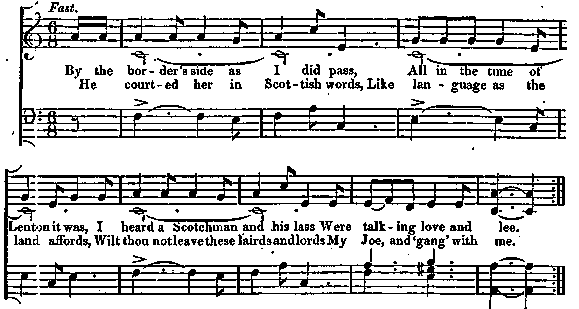Popular Music Of The Olden Time Vol 2
Ancient Songs, Ballads, & Dance Tunes, Sheet Music & Lyrics - online book
| Share page | Visit Us On FB |
|
|
||||
|
THE COMMONWEALTH. |
439 |
|||
|
|
||||
|
The parliament must willing be
That all the world may plainly see
How they will labour still for peace,
That all these bloody wars may cease.
For some will gladly spend their lives to defend
The King in all his right to reign;
So then 1 can tell all things will go well,
When we enjoy sweet peace again. |
"When all these things to pass shall come, Then farewell musket, pike, and drum : The lamb shall with the lion feed, Which were a happy time indeed. O let us all pray we may see the day That peace may govern in his name : For then I can tell all things will be well When the King comes home in peace again. |
|||
|
|
||||
|
BY THE BORDER'S SIDE AS I DID PASS.
A border-song, entitled " Ballad on a Scottish Courtship," from Ashmolean MSS., Nos. 36 and 37, Article 128. The tune is, in character, like Cavalilly man.
Ashmole held a-captain's commission under Charles L, in the civil war, and probably noted it down from hearing it sung. |
||||
|
|
||||
 |
||||
|
|
||||
|
The song consists of forty lines, but I did not transcribe further. FAIN I WOULD IF I COULD.
In The Dancing Master, from 1650 to 1665, this is entitled Fain I would if I could; and in the editions from 1670 to 1690 (with a trifling difference), JParthenia, or Fain I would. In Elizabeth Rogers' MS. Virginal Book, the same air is called The King's Complaint.
One of the ballads among the King's Pamphlets, which bears the date of the 23rd April, 1649, is "A Coffin for King Charles: A Crown for Cromwell: A Pit ibr the People;" and the direction is that " you may sing this to the tune' of Fain I would" (vol. viii., fob, and reprinted in Wright's Political Ballads, 8vo., ' p. 117.). It is a dialogue between Cromwell on,the throne, King Charles in his coffin, and the people in the pit. The date proves it to have been printed within three months after the King's execution. It consists of fifteen stanzas, of which three are subjoined. The first is— |
||||
|
|
||||